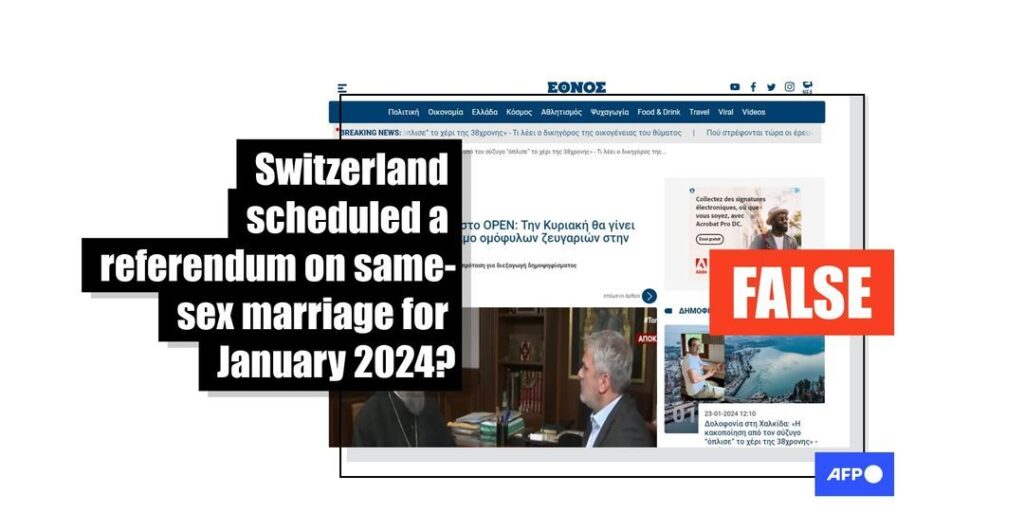The Greek government’s decision to legalise marriage and adoption for same-sex couples has sparked a huge debate in Greek politics and society, with the head of the Greek Orthodox Church saying that the government should hold a referendum on the issue. In an interview given to a private TV channel on January 20, 2024, Bishop Gabriel of New Ionia (a part of northern Athens) falsely claimed that Switzerland was going to hold a referendum on the issue of same-sex marriage the following day, Sunday, January 21, 2024. Many Greek media outlets subsequently picked up his statement without any additional information or context. However, no such vote was planned in Switzerland for that date. The country already held a national vote on the issue in September 2021, in which the majority of citizens supported the legalisation of same-sex marriage.
On January 10, 2024, Greek Prime Minister Kyriakos Mitsotakis announced that his government would move to legalise marriage and adoption for same-sex couples, prompting strong reactions from Greek politicians and the church (archived here). Less than 10 days later, on January 19, the Prime Minister said that the Greek parliament would vote on the issue in February 2024 (archived here).
The Greek Orthodox Church has been a strident opponent of the plan, with its governing body, the Holy Synod, issuing a circular to its dioceses in December 2023 in which it strongly condemned same-sex marriage and adoption (archived here). Before the Holy Synod unanimously expressed its formal opposition to the government’s bill on January 23 (archived here), the head of the Church of Greece, Archbishop Ieronymos, told the Greek press that “there should be a referendum” on the issue (archived here).
The Greek government has rejected the idea of a referendum on the issue (archived here).
In this context, in an interview given to the private TV channel OPEN on this issue on Saturday, January 20, 2024, Bishop Gabriel of New Ionia spoke out in favour of holding such a referendum in Greece. As an example, he cited a referendum on same-sex marriage which he claimed was going to be held in Switzerland the following day (archived here).
At 2:46 in the interview, he said: “I would simply like to inform our dear viewers that on the coming Sunday, in a country which, although it does not belong to the European Union, is on the European continent, Switzerland, there is a referendum on the very same issue and the people will be called upon to decide because that is what the Constitution of Switzerland… provides for”.
This was picked up by numerous media outlets and blogs in Greece, such as here, here and here, without any additional information or context. The media outlet Ethnos also headlined its article in line with this statement by the bishop.
However, Switzerland had no scheduled referendum on the issue on Sunday, January 21, 2024. In fact, it had no referendum on any issue planned for that day, official data showed. The Swiss people had already, however, accepted marriage for all in a referendum in 2021. Unlike most other European countries, Switzerland has a long tradition of popular votes and a system of direct democracy.

Screenshots of the misleading online articles. Images taken on 23/01/2024
Swiss referendum on same-sex marriage in 2021
A search on the Swiss government’s popular vote portal shows that no referendum was held on the issue of marriage on January 21, 2024 (archived here). Jacques Chapatte, Information Officer at Switzerland’s Federal Chancellery, confirmed that there had been no referendum on same-sex marriage on that date in Switzerland.
The Chancellery pointed to the timeline of popular votes, available in the archives and updated on January 19, 2024, which shows that the last popular vote in Switzerland was on June 18, 2023. That vote was not about marriage, but three separate proposals concerning the taxation of large corporations, climate protection and an amendment to a law governing measures against Covid-19 (archived here and here).
The next popular vote will take place on March 3 and will concern pension reforms (archived here).
However, Switzerland previously held a national referendum on same-sex marriage on September 26, 2021, in which 64.1% of voters approved its legalisation (archived here and here).
That referendum was called after the Federal Council (Swiss government) submitted an amendment to the Swiss Civil Code in December 2020, to legalize marriage for same-sex couples, known as “mariage pour tous” in Switzerland. A group of politicians and associations who opposed the amendment requested that it be put to a referendum. The Swiss system of direct democracy enables such referendums to be called over proposed laws.
The arguments of both parties and detailed explanations of this vote are available in the booklet distributed to Swiss citizens before each vote (available here, downloadable in French here). A similar publication is distributed before every popular vote in the country.
Direct democracy in Switzerland
Switzerland’s system of direct democracy dates back to the creation of the modern Swiss state in 1848. It allows its citizens to propose and vote on decisions made by the federal parliament via a referendum, or to propose constitutional amendments via a popular initiative (archived here).
Federal laws and other acts of the Federal Assembly are subject to an optional referendum. Citizens can demand that an adapted or amended law be put to a popular vote. This can be done within 100 days of publication of the text of the law, and 50,000 signatures must be collected for the people to be asked to vote.
The other Swiss voting instrument is the popular initiative, which enables the people to submit proposals to amend the Swiss Constitution. To be valid and put to the vote, a popular initiative must gather 100,000 signatures within 18 months. The authorities may submit a counter-proposal to the initiative, which is also put to the vote.
Specific dates in the next 20 years for each quarter are reserved for popular initiatives in Switzerland (archived here).
The Netherlands was the first country in the world to legalize same-sex marriage in 2001 (archived here). By 2024, a total of 16 European countries had legalized same-sex marriage (archived here).
Ireland was the first country in the world to put marriage for same-sex couples to a referendum in May 2015, which was accepted by 62% of voters. Slovenia also put the subject to a referendum in December 2015, with voters rejecting the proposal by 63.5%. However, the Slovenian Parliament legalized same-sex marriage in October 2022 and became the first post-communist country to do so.
AFP has in the past verified misleading claims about the LGBTQ community, such as this video purporting to show the Arc de Triomphe in Paris decorated with a rainbow-coloured installation, or a video that social media users claimed showed a performance at Athens Pride 2023.



